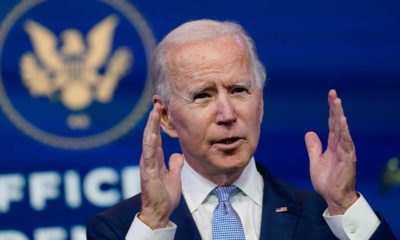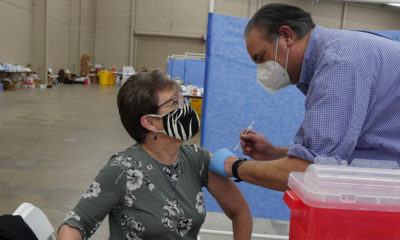Published
5 years agoon
By
AP News
NEW YORK — Protests erupting across the nation over the past week — and law enforcement’s response to them — are threatening to upend efforts by health officials to track and contain the spread of coronavirus just as those efforts were finally getting underway.
Reduced testing could “be giving the virus another head start,” Schaffner said.
And contract tracing, which is only just getting going in several states, is an even bigger concern. It involves people who work for or with health departments asking intimate questions about where a person has been and who they’ve been talking to — and getting full, truthful answers in return.
“In this current environment which has enhanced or brought forth a mistrust of governmental authority, it might make them disinclined to speak with anyone in government,” Schaffner said.
That is especially true in black communities trying to cope with episodes of police violence and longstanding frustrations with how they have been marginalized and mistreated by people who work for government agencies. And those are the communities that have been hardest hit by the coronavirus in the U.S. and most in need of public health measures to help control it.
In a press conference Saturday, Minnesota Public Safety Commissioner John Harrington used the term “contact tracing” when describing an investigation into arrested protesters there. He said the goal is to “see if there are crime or white supremacy organizations that have played a role” and “to understand how do we go after them, legally,” Harrington said.
But Harrington’s use of “contact tracing” by law enforcement may complicate the job of health workers as they try to track the virus’s spread, some experts said.
“That was an abuse of the word ‘contact tracing.’ That is not what contact tracing is,” said Dr. Tom Frieden, former director of the federal Centers for Disease Control and Prevention.
“Contact tracing is a service to patients and their contacts to provide services for patients and warning for contacts. It has nothing to do with police activity. Nothing,” said Frieden, who is currently president of Resolve to Save Lives, a nonprofit that works to prevent epidemics.
Galea said he hopes many people will separate in their minds the contact tracing done by public health workers from crime investigations by the police. But, he added, “I do think sometimes it’s difficult to make a distinction when you feel marginalized by, and targeted by, the entire government.”


Tulare County Gang Member, Two Fresnans Head to Federal Prison


California Pins Vaccine Hopes on Biden Administration


Capitol Photos, Videos Lead to California Doctor’s Arrest


Vaccine Chaos: Californians Scramble for Shots Amid Mixed Messaging


AP-NORC Poll: Virus, Economy Swamp Other Priorities for US


Walters: California Still Lags Behind in Vaccinations




